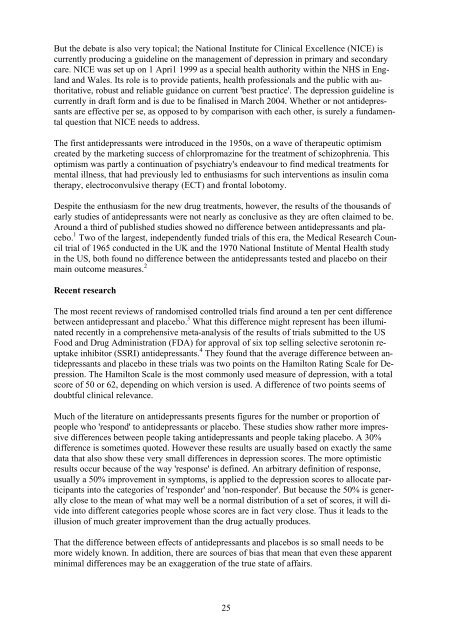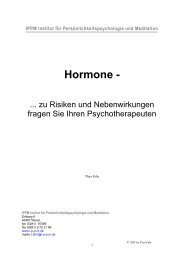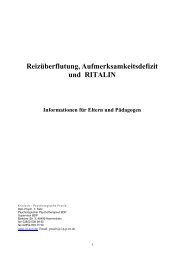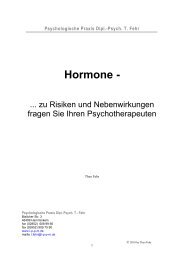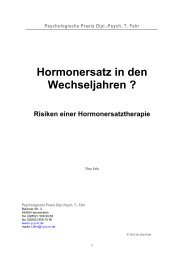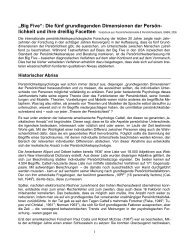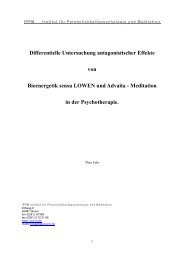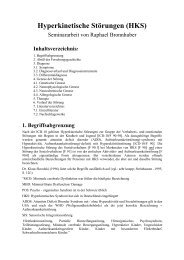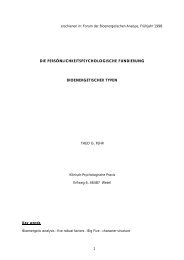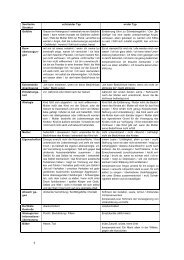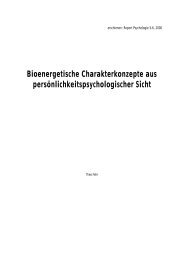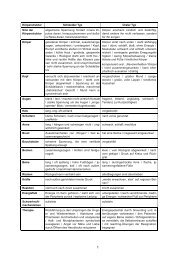Die Wirkung von Antidepressiva - IPPM
Die Wirkung von Antidepressiva - IPPM
Die Wirkung von Antidepressiva - IPPM
Sie wollen auch ein ePaper? Erhöhen Sie die Reichweite Ihrer Titel.
YUMPU macht aus Druck-PDFs automatisch weboptimierte ePaper, die Google liebt.
But the debate is also very topical; the National Institute for Clinical Excellence (NICE) is<br />
currently producing a guideline on the management of depression in primary and secondary<br />
care. NICE was set up on 1 Apri1 1999 as a special health authority within the NHS in England<br />
and Wales. Its role is to provide patients, health professionals and the public with authoritative,<br />
robust and reliable guidance on current 'best practice'. The depression guideline is<br />
currently in draft form and is due to be finalised in March 2004. Whether or not antidepressants<br />
are effective per se, as opposed to by comparison with each other, is surely a fundamental<br />
question that NICE needs to address.<br />
The first antidepressants were introduced in the 1950s, on a wave of therapeutic optimism<br />
created by the marketing success of chlorpromazine for the treatment of schizophrenia. This<br />
optimism was partly a continuation of psychiatry's endeavour to find medical treatments for<br />
mental illness, that had previously led to enthusiasms for such interventions as insulin coma<br />
therapy, electroconvulsive therapy (ECT) and frontal lobotomy.<br />
Despite the enthusiasm for the new drug treatments, however, the results of the thousands of<br />
early studies of antidepressants were not nearly as conclusive as they are often claimed to be.<br />
Around a third of published studies showed no difference between antidepressants and placebo.<br />
1 Two of the largest, independently funded trials of this era, the Medical Research Council<br />
trial of 1965 conducted in the UK and the 1970 National Institute of Mental Health study<br />
in the US, both found no difference between the antidepressants tested and placebo on their<br />
main outcome measures. 2<br />
Recent research<br />
The most recent reviews of randomised controlled trials find around a ten per cent difference<br />
between antidepressant and placebo. 3 What this difference might represent has been illuminated<br />
recently in a comprehensive meta-analysis of the results of trials submitted to the US<br />
Food and Drug Administration (FDA) for approval of six top selling selective serotonin reuptake<br />
inhibitor (SSRI) antidepressants. 4 They found that the average difference between antidepressants<br />
and placebo in these trials was two points on the Hamilton Rating Scale for Depression.<br />
The Hamilton Scale is the most commonly used measure of depression, with a total<br />
score of 50 or 62, depending on which version is used. A difference of two points seems of<br />
doubtful clinical relevance.<br />
Much of the literature on antidepressants presents figures for the number or proportion of<br />
people who 'respond' to antidepressants or placebo. These studies show rather more impressive<br />
differences between people taking antidepressants and people taking placebo. A 30%<br />
difference is sometimes quoted. However these results are usually based on exactly the same<br />
data that also show these very small differences in depression scores. The more optimistic<br />
results occur because of the way 'response' is defined. An arbitrary definition of response,<br />
usually a 50% improvement in symptoms, is applied to the depression scores to allocate participants<br />
into the categories of 'responder' and 'non-responder'. But because the 50% is generally<br />
close to the mean of what may well be a normal distribution of a set of scores, it will divide<br />
into different categories people whose scores are in fact very close. Thus it leads to the<br />
illusion of much greater improvement than the drug actually produces.<br />
That the difference between effects of antidepressants and placebos is so small needs to be<br />
more widely known. In addition, there are sources of bias that mean that even these apparent<br />
minimal differences may be an exaggeration of the true state of affairs.<br />
25


